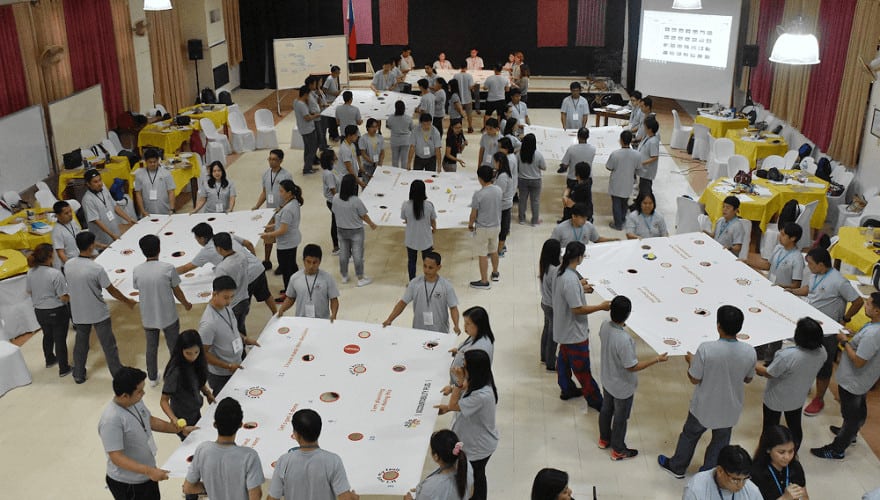Imagine being a student in 2025. You open your phone, and within seconds, AI can solve your math problem, write your essay, or even suggest what career you might take someday. You don’t even need to ask your kuya or teacher—answers arrive faster than your questions.
It feels powerful. Convenient. Almost magical.
Where will those answers take you?
I’ve seen this before. When I taught Values Education years ago, students could recite all the values printed in posters—respeto, malasakit, bayanihan. They knew the words. But when real-life choices came, they often froze. Or worse, they copied what everyone else was doing.
Now, with AI everywhere, the temptation is greater. It’s easy to let the machine think for us. Yet no matter how advanced technology becomes, it cannot tell you what is right, what is kind, or what is worth living for. That’s what values are for.
AI Is Fast, But Not Wise
I remember a student who once showed me a perfect essay. It had all the right words, polished grammar, and even a strong conclusion. When I asked how long it took him, he smiled shyly and said, “Sir, ChatGPT did it in less than a minute.”
The essay was impressive on the surface. But when I asked him, “Do you agree with what’s written here?”—he fell silent. He hadn’t even read it carefully. The machine gave him speed, but not meaning.
That’s the danger. AI can process information faster than any human being. It can summarize, analyze, and predict. But AI cannot feel hiya. It cannot understand pakikipagkapwa. It cannot wrestle with conscience or choose kindness when it’s inconvenient.
Filipinos know this deeply. During calamities, for example, no app or algorithm tells a neighbor to share food or open their home. That comes from mabuting loob. Technology may amplify what we do, but it cannot decide what we value.
AI is fast. But wisdom—the ability to know what is right, what is just, and what is human—comes only from values.
Values Are the Compass
When I was in college, a typhoon hit Central Luzon and displaced thousands of families. Relief goods poured in, but what struck me most wasn’t the trucks of supplies—it was the sight of neighbors carrying rice in plastic bags, cooking food in big pots, and sharing whatever little they had. No one asked who had money, who had degrees, or who had power. They simply acted out of bayanihan.
That’s what values do. They point us toward what matters most, especially when life feels uncertain. A compass doesn’t stop the storm, but it keeps you from being lost.
In the age of AI, values are even more critical. When algorithms recommend what video to watch or what article to believe, you need a compass to ask: Is this respectful? Is this truthful? Is this helpful to others?
Filipino values like bayanihan (collective help), pakikipagkapwa (seeing others as your equal), and resilience (the courage to stand again) act as steady directions in a world full of shortcuts. They remind us that being smart is not enough. We must also be good.
The Danger Without a Compass
Not long ago, I met a high schooler who bragged that he could finish all his assignments in under an hour. He used AI to generate book reports, math solutions, even science projects. At first, his teachers were impressed—until one day, he submitted a reflection paper about a story he had never actually read. When asked to explain his work in class, he froze. His classmates laughed. What seemed like a shortcut quickly became a source of shame.
That’s the risk of living without a compass. AI can give you efficiency, but not integrity. It can help you look smart, but not actually be wise.
We see the same danger in the bigger world. Fake news spreads because people share without asking, “Is this true?” Online bullying escalates because no one pauses to ask, “Is this kind?” Technology makes it faster—but without values, it also makes mistakes travel farther.
A ship without a compass may move quickly, but it will eventually crash. In the same way, a generation that relies on AI without values may get ahead for a moment, but it risks losing direction altogether.
How to Use Values as Your Compass in the AI Era
One of my former students, Liza, loved using AI for her studies. At first, she admitted she was tempted to copy-paste everything. But one day, she paused. “Sir, I realized I don’t want to become dependent,” she told me. Instead of letting the tool decide for her, she began using it differently: to get ideas, then rewriting them in her own words, guided by her values. She treated AI like a map, but her values remained the compass.
Here are a few ways young people today can do the same:
- Pause Before You Post
Before sharing anything online, ask: Does this reflect respect and truth? A single post can either build trust or break it. - Choose Growth Over Shortcuts
AI can solve a math problem instantly, but the value of sipag at tiyaga reminds us to grow through effort. Use AI to guide, not replace, your learning. - Practice Digital Bayanihan
In group chats or online study sessions, don’t just share answers. Share explanations. Help classmates understand, not just submit. That’s bayanihan in action. - Let Hiya and Respeto Guide You
Technology gives us anonymity, but our values remind us to use words to uplift, not to shame. AI may generate the text, but it’s your choice to make it compassionate.
With these small shifts, technology becomes a tool for progress, not a trap for shortcuts. AI may light the path, but it’s Filipino values that show the way.
Invitation to Teachers
When I talk to teachers in DepEd, many tell me the same challenge: “Our students are so quick with technology, but slow when it comes to reflection.” They can generate answers in seconds, yet hesitate when asked, “What do you really believe?”
This is where teachers play a vital role. We are not competing with AI. We are cultivating what AI can never replace—values, conscience, and human connection.
Here are some ways values education can meet the AI era:
- AI vs. Human Judgment Role-Play
Present students with an AI-generated answer and a real-life situation. Ask: “If you were in this situation, guided by Filipino values, would you act the same way?” - Storytelling with Reflection
Share true stories of bayanihan or pakikipagkapwa in times of crisis. Then ask students: “How would you apply this value if you were making decisions online?” - Digital Bayanihan Projects
Assign group work where students use AI to gather information—but require them to add their own reflection, anchored in values like respeto and malasakit.
These classroom activities remind students that technology is not the master, but the servant. The real goal is not just to be skilled, but to be values-driven citizens who can thrive in a digital and human world.
Compass for Life
AI will only get faster. New apps will arrive, new tools will promise shortcuts, and the pressure to keep up will grow stronger. But speed without direction is dangerous. That’s why values matter more than ever.
Filipino values are not old-fashioned posters hanging on a classroom wall. They are living compasses—bayanihan guiding us to help one another, pakikipagkapwa reminding us of our shared humanity, resilience teaching us to rise after every fall. These values are not obstacles to progress. They are what make progress meaningful.
AI may give you directions. But only your values can decide the destination.
So whether you are a student using AI for homework, a teacher designing lessons for the next generation, or a Filipino abroad carrying our culture into the world, remember this: technology may change, but our compass remains.
👉 Want to dive deeper? Explore the Filipino Values hub where I share more stories, guides, and tools to help us live our values in the age of AI.
If you want Filipino values to show up as real behavior at work…
Let’s turn it into a culture shift experience.
→ Shift Experiences



